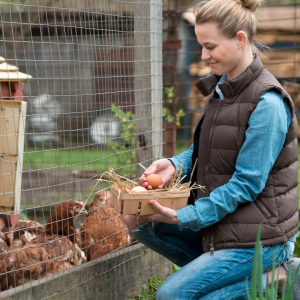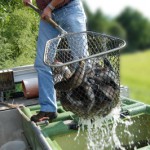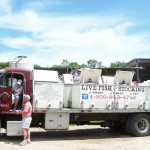 Autumn is upon us and it’s time to say hello to fresh air and say goodbye to stifling hot temperatures! Of course, if you’re raising chickens for eggs, you will need to take a few steps to ensure your hens stay in production during the fall and winter months.
Autumn is upon us and it’s time to say hello to fresh air and say goodbye to stifling hot temperatures! Of course, if you’re raising chickens for eggs, you will need to take a few steps to ensure your hens stay in production during the fall and winter months.
Molting or feather loss is a natural occurrence in birds that is determined by genetics and the environment. Some breeds will lose and re-grow feathers faster than other breeds. The main trigger for the molting process is day length. When days have less than 12 hours of daylight, the birds will be stimulated to reduce, or even stop egg production, and grow new feathers.
To prevent a sudden molt and maintain egg production, the important thing to do is to provide supplemental lighting. It does not take much supplemental light. Provide one light in the chicken house, set on a timer to provide 14-18 hours of light. A 60-watt bulb will be enough. Set the timer to turn the lights on before dawn. These extended “daylight” hours will provide enough light to maintain egg production. Any molt during this period will be a slow gradual feather loss. Chickens are very dependent on this supplemental light – if the light is inadequate for even one day, that may be enough to send the hens into a molt.
Additional steps you can take to maintain egg production and bird health during the fall months includes:
- Make sure to provide a high-quality complete feed (such as Purina Homegrown or Farmers Coop’s Riverstone Pellets) instead of “scratch” to ensure that hens have sufficient protein, vitamins, and minerals to produce hearty, golden-yoked eggs. Adequate calcium is especially important for strong shell formation.
- Always make sure that plenty of feed and freshwater are available. Heated waterers may be needed to keep water from freezing.
- Stagger the ages of your flock to diminish the likelihood that they will want to molt at the same time, thereby ensuring a continuous supply of eggs.
- Protect your hens from the increasingly cold weather by weatherproofing your coop (but still allow for adequate ventilation). Should you experience an early cold snap, turn on a heat lamp.
- Periodically inspect your birds to spot any signs of disease. If you observe droopy, sick-looking birds or very loose droppings on the floor, an illness may be the culprit, not molting. Take immediate action with your veterinarian.
The stress of molting can take a toll on birds. By providing for your hens’ nutrition, environment and comfort, you will be able to both maintain egg production and bird health. This will keep your flock going strong into the New Year.



